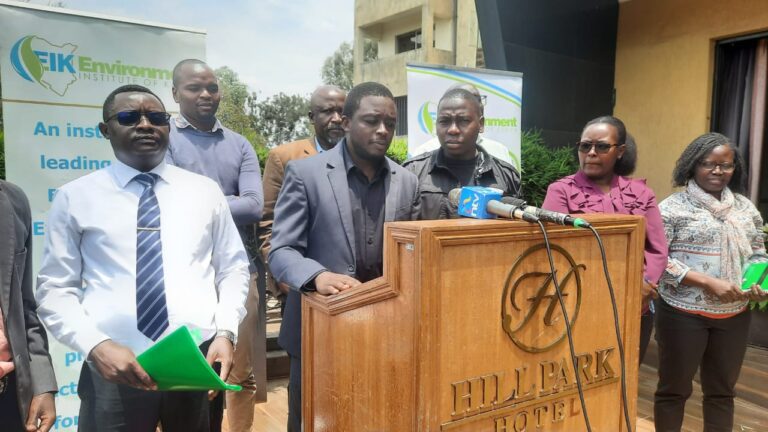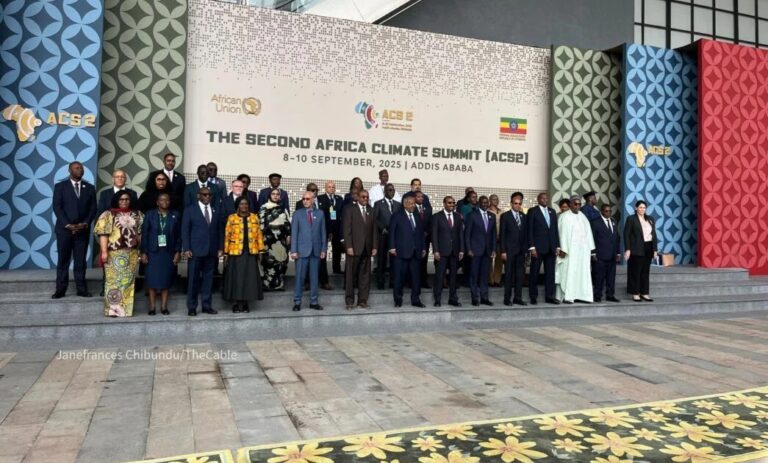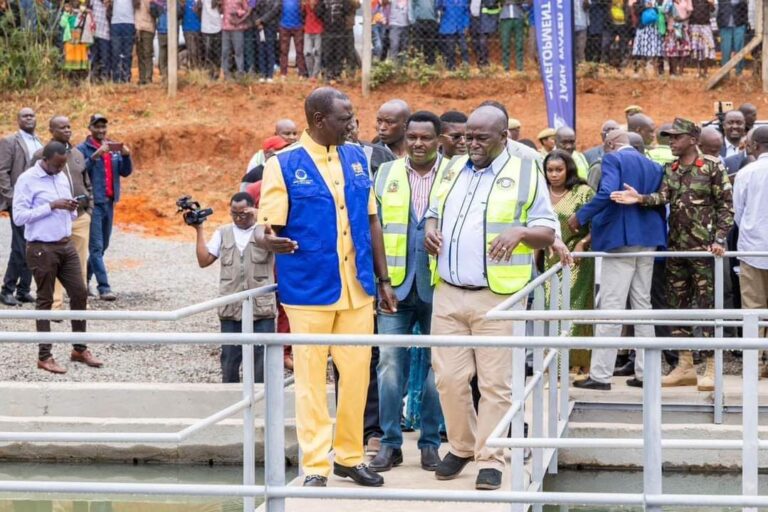
Climate activists hold a march in Nairobi at a past function. Photo/VOA
By Daisy Okiring
Nairobi, Kenya – August 23, 2025
Africa contributes less than 4 percent of global greenhouse gas emissions, yet it is home to 17 of the 20 countries most vulnerable to climate change, according to the UN Environment Programme. This paradox has become one of the defining injustices of the 21st century. While Africa chokes under the weight of worsening droughts, deadly floods, and rising food insecurity, the global conferences designed to address the crisis seem trapped in a cycle of promises without delivery.
Every year, African leaders, activists, and negotiators travel thousands of miles to COP summits—Copenhagen, Glasgow, Sharm el-Sheikh, Dubai, and now Baku—hoping for breakthroughs. But for many, the yearly ritual has come to represent more fatigue than progress.
“Year after year, we attend these meetings, but the outcome for Africa remains the same—more promises, little delivery,” President William Ruto said at the Africa Climate Summit in Nairobi in 2023. His frustration reflects the exhaustion of a continent living the reality of a crisis it did not create.
The cost of climate inaction
The economic burden is staggering. The African Development Bank estimates climate change already costs the continent between 5 and 15 percent of GDP annually. In the Horn of Africa, the worst drought in 40 years has pushed more than 23 million people in Kenya, Ethiopia, and Somalia into severe hunger, according to the World Food Programme.
Floods have devastated Nigeria and Chad, displacing millions, while Mozambique has been hit repeatedly by cyclones—Idai in 2019, Freddy in 2023—that wiped out entire towns. Rising sea levels threaten West African coastal cities like Lagos, Abidjan, and Dakar, where millions of lives and billions in infrastructure are at risk.
Read More: The hunger paradox: Why africa feeds the world but can’t feed itself
“We cannot continue to be the world’s shock absorbers,” said Moussa Faki Mahamat, Chairperson of the African Union Commission. “Africa pays the highest price for climate change while contributing the least to the problem.”

Pledges versus reality
At COP15 in Copenhagen in 2009, wealthy countries promised to mobilize $100 billion annually by 2020 for climate finance. That deadline came and went, and by 2022, the OECD reported only $89.6 billion had been delivered—much of it as loans, not grants. Africa, which needs around $277 billion a year until 2030, according to the African Development Bank, receives only a fraction.
UN Secretary-General António Guterres has repeatedly condemned this failure. “Those who did the least to cause the crisis suffer the most, and those who caused it refuse to take responsibility,” he said at COP27.
For many Africans, the cycle has become predictable: attend COP, make demands, hear pledges, return home with little to show. This disillusionment is particularly pronounced among Africa’s youth, who make up 60 percent of the population and see their futures clouded by climate uncertainty.
Read More: How Europe’s 2040 climate target could redefine the global carbon economy
The rise of African climate diplomacy
Still, fatigue does not mean surrender. The 2023 Africa Climate Summit in Nairobi marked a turning point. President Ruto declared, “Africa must stop being a passive victim of climate change. We must position ourselves as the solution. Our renewable energy potential can power not just our continent but the world.”
The numbers back him up. Africa holds 40 percent of global solar potential but accounts for less than 1 percent of installed capacity. The Democratic Republic of Congo controls 70 percent of global cobalt reserves, critical for electric vehicle batteries. Mozambique and Tanzania hold vast natural gas deposits.

The Nairobi Declaration emphasized that Africa is not merely a victim but a critical player in the global transition. The challenge is ensuring that this potential is not once again exploited by others, as has been the case with oil, gas, and minerals.
The politics of dependency
One of the biggest criticisms of Africa’s climate strategy has been its reliance on Western promises. Climate aid is not charity—it is justice, many argue—but waiting for pledges leaves Africa exposed. Instead, experts call for stronger domestic financing mechanisms.
Nigeria has already issued sovereign green bonds worth over $200 million. Kenya has launched a voluntary carbon market framework, and the African Development Bank is driving the Africa Adaptation Acceleration Program, aiming to mobilize $25 billion by 2025.
“Africa must stop waiting for handouts,” said Akinwumi Adesina, President of the AfDB. “We need to finance our own survival and growth. The resources are here.”
By building its own financial architecture, Africa can negotiate with global powers from a position of strength rather than dependency.
Global hypocrisy and shifting geopolitics
Even as Africa is urged to keep fossil fuels in the ground, global powers are quietly expanding theirs. The United States approved new oil drilling projects in Alaska in 2023. China continues funding coal plants abroad. After the Russia-Ukraine war disrupted gas supplies, European nations rushed to sign long-term natural gas deals with African states.
South Africa’s President Cyril Ramaphosa addressed the contradiction at COP28: “We cannot be asked to stop using our resources while others expand theirs. Climate justice means fairness, not exploitation.”
Meanwhile, Africa’s influence on the global stage is growing. The continent’s admission to the G20 in 2023 signaled recognition of its importance in shaping the future economy and climate agenda. With its mineral wealth, renewable energy potential, and youthful labor force, Africa is no longer a silent participant—it is a necessary partner.
Read More: Climate resilience: The inspiring story of Salina Chepsat’s solar-powered farm
Youth and grassroots movements
While leaders argue, Africa’s youth are taking action. Ugandan activist Vanessa Nakate has repeatedly called out global hypocrisy, saying, “We cannot eat promises. We need action.”
In Kenya, the Green Generation Initiative has planted millions of trees and integrated environmental education into schools. Across Nigeria, Ghana, and South Africa, tech start-ups are building microgrids powered by solar and wind, tackling energy poverty while cutting emissions.

African youth have become some of the most vocal and visible climate advocates at global conferences, refusing to be sidelined. Their demand is clear: debt cancellation for climate-vulnerable nations and a seat at the table in shaping the transition.
Time for Africa’s own COP
Some experts argue that Africa should not only attend global summits but also host its own independent climate negotiations. A continental COP would allow African states to set priorities, pool resources, and showcase solutions tailored to their needs.
The idea is not far-fetched. The African Continental Free Trade Area has already demonstrated the power of regional cooperation. Similarly, the Africa Finance Corporation has mobilized billions for infrastructure. A climate-focused equivalent could galvanize the continent’s green transition.
“We need to Africanize climate diplomacy,” said Senegal’s President Macky Sall. “Let us come to the table not as beggars but as equal partners.”
A moment of reckoning
As the world prepares for COP30 in Belém, Brazil, in 2025, Africa faces a defining choice. Will it continue chasing pledges that rarely materialize, or will it take control of its climate destiny? The World Bank warns that without urgent adaptation, 86 million Africans could be displaced by climate change by 2050.
Yet amid the frustration, Africa’s potential shines brighter than ever. From vast solar fields in the Sahel to hydropower in Ethiopia and cobalt mines in the Congo, the continent holds many of the keys to the world’s low-carbon future.

Building Africa’s climate future
COP fatigue should not mean disengagement. Instead, it must push Africa to craft its own agenda, powered by renewable energy, backed by green financing, and supported by its youthful population.
As António Guterres said, “Africa has the youngest population, the biggest potential, and the most to lose. If Africa leads, the world will follow.”
The time has come for Africa to move from the waiting room of global climate diplomacy to the driver’s seat of its own solutions. The climate crisis is not waiting—and neither should Africa.



